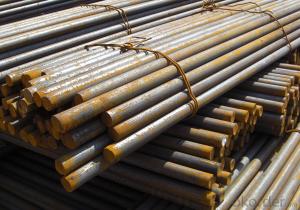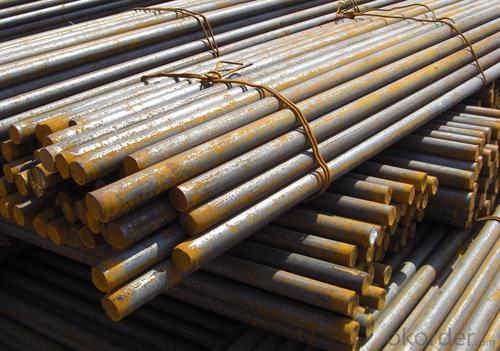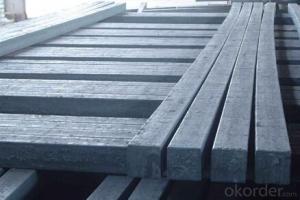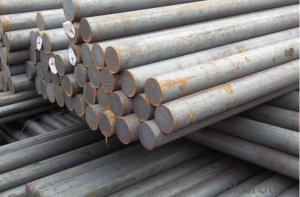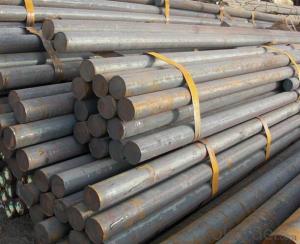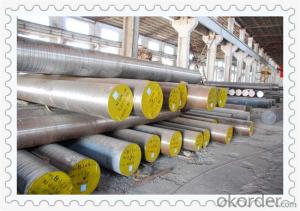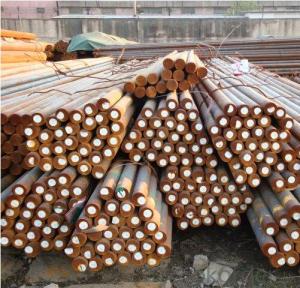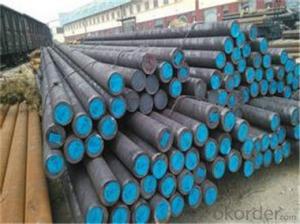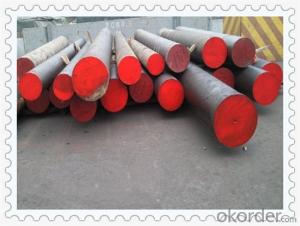Hot Forged Alloy Structure Steel Round Bars Special Steel
- Loading Port:
- China main port
- Payment Terms:
- TT OR LC
- Min Order Qty:
- 30 m.t.
- Supply Capability:
- 10000 m.t./month
OKorder Service Pledge
OKorder Financial Service
You Might Also Like
Specification
Steel bar is widely used in hardware, chemistry, foodstuff, medicine apparatus, making industry, computer or notebook components, etc. Common steel bar grade include Chinese Standard: 20#, 25#, 35#, 45#, 50#, 60#;Japan Standard: S20C, S25C, S35C, S45C, S55C, S60C;US Standard: AISI1020, AISI1040, AISI1045, AISI1050;Europe Standard: CK15, C. 22, C45, CK45, C60, CK60; C45E.
Chemical composition of steel bar
| Standard | C | Si | Mn | Cr | Ni | P/S ≤ |
| DIN | ≤0.15 | ≤1.0 | ≤2.0 | 18 | 9 | 0.03 |
| GB | ≤0.15 | ≤1.0 | ≤2.0 | 18 | 9 | 0.03 |
Product show
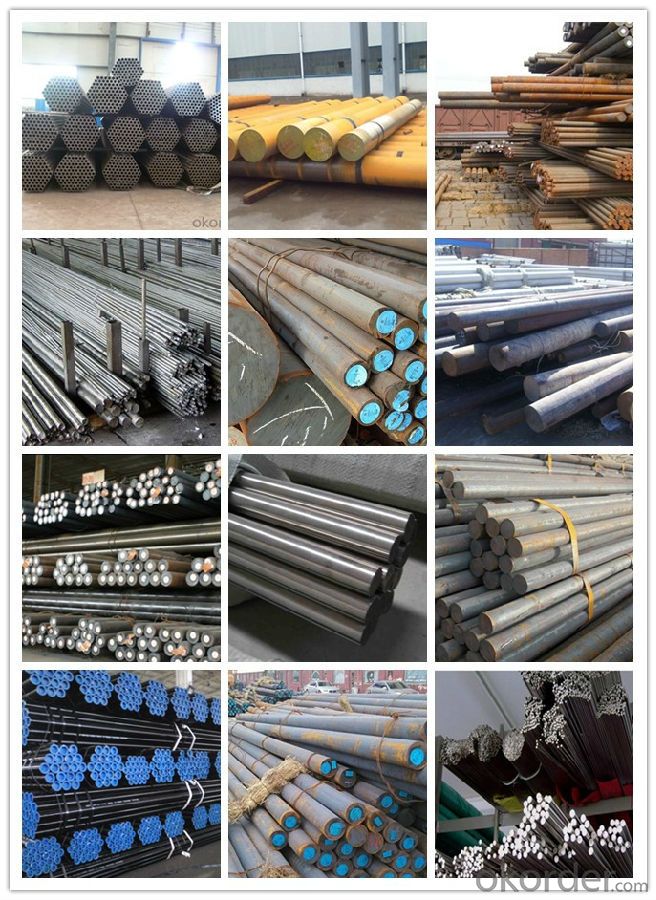
Workshop show
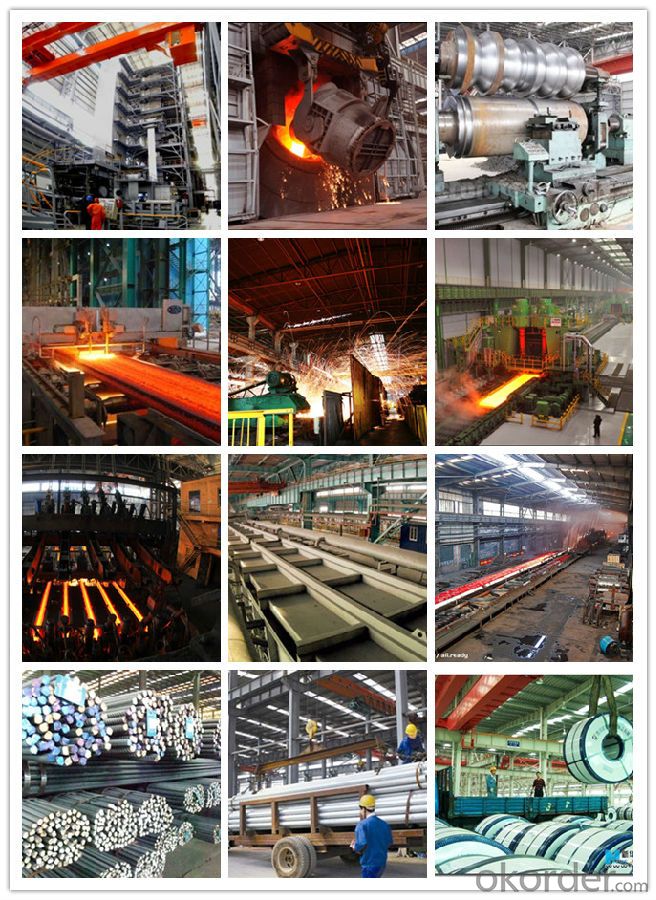
Shipping
1. FedEx/DHL/UPS/TNT for samples, Door-to-Door;
2. By Air or by Sea for batch goods, for FCL; Airport/ Port receiving;
3. Customers specifying freight forwarders or negotiable shipping methods!
Delivery Time: 3-7 days for samples; 5-25 days for batch goods.
Payment Terms
1.Payment: T/T, L/C, Western Union, MoneyGram,PayPal; 30% deposits; 70% balance before delivery.
2.MOQ: 1pcs
3.Warranty : 3 years
4.Package Informations: 1) EXPORT, In 20 feet (GW 25 ton) or 40 feet Container (GW 25 ton)
2)as customer's requirement
Main Product
Plastic Mould Steel
DIN 1.2311,1.2738,1.2083,1.2316 etc.
AISI P20,P20+Ni,420 etc.
JIS SUS420J2
Hot Work Steel
DIN 1.2344,1.2343,1.2367,1.2365,1.2581,1.2713 etc.
AISI H13,H11,H10,H21, etc.
JIS SKD61,SKD6,SKD5,SKT4 etc.
Cold Work Steel
DIN 1.2739, 1.2601, 1.2080, 1.2436, 1.2631, 1.263, 1.2510, 1.2327 etc.
AISI D2, D5, D3, D6, A8, A2, O1 etc.
JIS SKD10, SKD11, SKD1, SKS3 etc.
High Speed Steel
DIN 1.3343, 1.3243, 1.3247, 1.3355 etc.
AISI M2, M35, M42, T1 etc.
JIS SKH51, SKH35, SKH59, SKH2 etc.
Alloy Structural Steel
DIN 1.7035,1.6511,1.7220,1.7225 etc.
AISI 5140, 4340, 4135, 4140 etc.
JIS SCr440,SNCM439,SCM435,SCM440 etc.
Stainless & Carbon Steel or Others
DIN 1.4125,1.1191 etc
AISI 440C,1045, 1020 etc.
JIS SUS440C,S45C etc
Why choose us?
(1) The leading exporter in China special steel industry.
(2) Large stocks for various sizes, fast delivery date.
(3) Good business relationship with China famous factories.
(4) More than 7 years steel exporting experience.
(5) Good after-sales service guarantee.
- Q: What are the different methods of joining special steel?
- There are several methods of joining special steel, including welding, brazing, soldering, and mechanical fastening. Welding involves melting and fusing the steel pieces together using heat, while brazing and soldering use a filler metal with lower melting points to join the steel. Mechanical fastening methods, such as bolting or riveting, rely on physical connections to hold the steel pieces together without altering their properties. Each method has its own advantages and limitations, and the choice depends on factors such as the type of steel, the desired strength, and the specific application.
- Q: What are the different coating and plating options for special steel?
- There are various coating and plating options available for special steel, depending on the desired outcome and application. Some common options include electroplating with metals like nickel, zinc, or chrome for enhanced corrosion resistance, as well as hot-dip galvanizing to provide a thick layer of zinc coating. Other options include powder coating, which offers durability and a wide range of colors, and PVD (Physical Vapor Deposition) coating, which provides a thin, protective layer using vaporized materials like titanium or chromium. Additionally, specialized coatings like Teflon or ceramic coatings can be applied for increased non-stick properties or heat resistance. Ultimately, the choice of coating or plating depends on the specific requirements and performance expectations for the special steel.
- Q: How does special steel perform in high-pressure and high-temperature environments?
- Special steel is specifically engineered to excel in environments with high pressure and temperature. It possesses unique qualities that allow it to withstand extreme conditions without deforming, corroding, or failing. One of the main attributes of special steel is its exceptional strength. It is designed to have superior mechanical properties, including outstanding tensile strength. This enables it to resist the immense pressure exerted on it in high-pressure environments, ensuring that it maintains its structural integrity and does not buckle or collapse under the force. Furthermore, special steel is highly resistant to corrosion and oxidation, even at elevated temperatures. This resistance is crucial in high-temperature settings where hot gases, steam, or corrosive chemicals can cause regular steel to deteriorate rapidly. Special steel's ability to resist corrosion and oxidation ensures its longevity and reliability, making it an ideal choice for applications in challenging conditions. Additionally, special steel exhibits excellent heat resistance. It can endure extreme temperatures without compromising its mechanical properties, such as strength and hardness. This characteristic is vital in high-temperature environments where conventional steel would weaken, soften, or even melt. Special steel's capacity to maintain its structural stability even in extreme heat guarantees the safety and reliability of equipment and structures operating in such conditions. Moreover, special steel is renowned for its exceptional thermal conductivity. This property allows it to efficiently transfer heat away from the high-temperature environment, preventing localized hotspots and thermal stress. By effectively dissipating heat, special steel ensures the overall stability and performance of equipment and structures under high-pressure and high-temperature conditions. In conclusion, special steel excels in high-pressure and high-temperature environments due to its superior strength, resistance to corrosion and oxidation, heat resistance, and excellent thermal conductivity. These qualities make special steel a reliable and durable material for various applications, including power generation, oil and gas exploration, aerospace engineering, and many others.
- Q: What are the advantages of using special steel in industrial applications?
- There are several advantages of using special steel in industrial applications. Firstly, special steel offers exceptional strength and durability, making it suitable for heavy-duty tasks. The unique composition and manufacturing process of special steel result in a material that can withstand high levels of stress, extreme temperatures, and harsh environmental conditions. This makes it ideal for industries such as construction, automotive, and manufacturing, where reliable and long-lasting materials are required. Secondly, special steel exhibits excellent corrosion resistance. It can resist the damaging effects of moisture, chemicals, and other corrosive agents, which is crucial in industries like marine, oil and gas, and chemical processing. The corrosion resistance of special steel reduces the need for frequent maintenance and replacement, saving both time and costs for industrial applications. Furthermore, special steel offers superior machinability and formability. It can be easily shaped, cut, and welded to meet specific design requirements. This versatility allows for complex and intricate designs in various industrial applications, including machinery, tools, and equipment. Another advantage of special steel is its ability to maintain its properties at high temperatures. It has excellent heat resistance, ensuring that it remains strong and stable even under extreme heat conditions. This makes special steel suitable for applications involving high-temperature environments, such as aerospace, power generation, and furnace components. Additionally, special steel can exhibit excellent wear resistance and hardness. It can withstand abrasion, friction, and impact, making it ideal for applications where materials are subjected to heavy wear and tear, such as mining, construction equipment, and cutting tools. The wear resistance of special steel ensures that components have a longer lifespan and require less frequent replacement. In conclusion, the advantages of using special steel in industrial applications include exceptional strength and durability, corrosion resistance, machinability and formability, heat resistance, and wear resistance. These properties make special steel a preferred choice for a wide range of industries, contributing to improved performance, longevity, and cost-effectiveness.
- Q: What are the advantages of using special steel in the marine sector?
- There are several advantages of using special steel in the marine sector. Firstly, special steel is known for its exceptional strength and durability. This is particularly important in the marine sector where structures are constantly exposed to harsh and corrosive conditions such as saltwater, extreme temperatures, and constant vibrations. Special steel has a high resistance to corrosion, making it an ideal choice for marine applications, as it can withstand the corrosive effects of seawater and prevent structural damage. Additionally, special steel offers excellent weldability, which is crucial in the construction of marine vessels and offshore structures. The ability to join steel components together seamlessly ensures the overall integrity and strength of the structure, reducing the risk of failures or accidents. Furthermore, special steel has a high fatigue strength, meaning it can withstand cyclic loading over long periods of time without experiencing failure. This is particularly important in the marine sector where structures are subjected to constant dynamic loads, such as waves and wind forces. The fatigue resistance of special steel ensures the longevity and reliability of marine structures, reducing maintenance costs and improving safety. Moreover, special steel offers design flexibility and versatility. It can be easily shaped and molded into various complex forms, allowing for innovative and efficient designs in marine structures and vessels. This flexibility also enables the optimization of weight, which is crucial in the marine sector to improve fuel efficiency and reduce emissions. Lastly, special steel is readily available and cost-effective. With advancements in manufacturing processes and technologies, special steel production has become more efficient and cost-effective, making it a viable choice for the marine sector. Its availability and affordability make it a preferred material for various marine applications. In conclusion, the advantages of using special steel in the marine sector include its exceptional strength and durability, resistance to corrosion, excellent weldability, high fatigue strength, design flexibility, and cost-effectiveness. These properties make special steel a reliable and efficient material for constructing marine structures, ensuring their longevity, safety, and operational efficiency.
- Q: How is special steel graded?
- Special steel is graded based on various factors such as chemical composition, mechanical properties, and the intended application. It typically involves assessing the steel's alloying elements, heat treatment processes, and quality control measures to determine its grade and suitability for specific industrial purposes.
- Q: How is special steel used in the marine manufacturing process?
- Special steel is used in the marine manufacturing process for various applications such as shipbuilding, offshore structures, and marine equipment. It possesses exceptional properties like corrosion resistance, high tensile strength, and durability, making it suitable for constructing hulls, decks, and other critical components of ships and offshore platforms. Special steel is also used in manufacturing marine equipment like propeller shafts, rudders, and anchors, ensuring their reliability and performance in harsh marine environments.
- Q: Are there any disadvantages of using special steel?
- Yes, there are some disadvantages of using special steel. Firstly, special steel is generally more expensive than regular steel. The production process of special steel involves additional alloying elements and heat treatments, which contribute to the higher cost. This can make it less economical for certain applications where cost is a major consideration. Secondly, special steel may have limited availability compared to regular steel. Special steel grades are often produced in smaller quantities and may only be available from specific suppliers. This can lead to longer lead times and difficulties in sourcing the required quantity of special steel, especially for large-scale projects. Additionally, the increased complexity of special steel can make it more difficult to work with. Special steel may require specialized knowledge, skill, and equipment to handle and process. This can lead to higher manufacturing costs and potential production delays if the necessary expertise or resources are not readily available. Furthermore, the high strength and hardness of some special steel grades can make them more prone to brittleness. This means that special steel may be more susceptible to cracking or breaking under certain conditions, especially when subjected to extreme temperatures or sudden impact loads. This can be a drawback in applications that require high toughness or resistance to fracture. Lastly, special steel may have limited applications due to its specific properties. While it offers enhanced characteristics such as corrosion resistance, high temperature resistance, or improved mechanical properties, these advantages may not be relevant or necessary for every application. In such cases, using special steel may be an unnecessary expense without any tangible benefits. In conclusion, special steel has its drawbacks, including higher costs, limited availability, increased complexity, potential brittleness, and limited applicability. Therefore, careful consideration should be given to the specific requirements of the project before opting for special steel.
- Q: What are the different methods for nitriding special steel?
- There are several methods for nitriding special steel, including gas nitriding, salt bath nitriding, plasma nitriding, and ion nitriding.
- Q: Can special steel be used in the manufacturing of precision instruments?
- Yes, special steel can be used in the manufacturing of precision instruments. Special steel possesses high strength, durability, and resistance to corrosion, making it suitable for producing components of precision instruments that require high precision and accuracy. Additionally, special steel can be customized to meet specific requirements such as hardness, conductivity, and magnetic properties, further enhancing its suitability for manufacturing precision instruments.
Send your message to us
Hot Forged Alloy Structure Steel Round Bars Special Steel
- Loading Port:
- China main port
- Payment Terms:
- TT OR LC
- Min Order Qty:
- 30 m.t.
- Supply Capability:
- 10000 m.t./month
OKorder Service Pledge
OKorder Financial Service
Similar products
Hot products
Hot Searches
Related keywords
